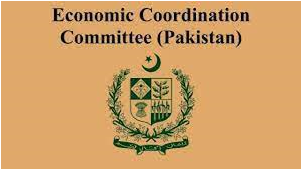INP-WealthPk
Abdul Ghani
The Economic Coordination Committee (ECC) of the Cabinet on Tuesday directed the Finance Division to immediately release Rs4 billion to the National Disaster Management Authority (NDMA) for urgent rescue and relief operations in flood- and rain-affected areas of the country.

The decision was taken at an ECC meeting chaired by Federal Minister for Finance and Revenue Senator Muhammad Aurangzeb. The session, which was attended by senior federal ministers, secretaries, and relevant government officials, approved a total package of Rs5.8 billion for the NDMA. The funds are aimed at providing timely humanitarian assistance and rehabilitation support to communities devastated by the recent spell of heavy monsoon rains and flash floods, particularly in northern and hilly regions.
Officials told WealthPK that the ECC decision underscores the government’s resolve to ensure rapid response and adequate financing for emergency management in coordination with federal and provincial institutions. NDMA will utilise the funds to supply food, medicines, temporary shelters, and other essential relief goods to the displaced and vulnerable families. While allocating the emergency relief, the ECC also engaged with a broad spectrum of pressing financial and development issues.
The Committee approved allocations for strengthening digital payments under the RAAST programme, and also sanctioned a Rs2 billion grant for the National Energy Efficiency and Conservation Authority (NEECA) to launch the Prime Minister’s Fan Replacement Programme, which is designed to promote energy efficiency by phasing out outdated, high-consumption fans.
Furthermore, the ECC endorsed the New Energy Vehicle Policy 2025-30, which seeks to encourage investment in the electric and hybrid vehicle sector, reduce reliance on fossil fuels, and improve Pakistan’s environmental sustainability profile. During the meeting, the finance minister reiterated the government’s commitment to not only provide timely support to disaster-hit citizens but also push forward with economic reforms to ensure long-term stability.
“Immediate relief is a priority, but structural reforms to strengthen our economy remain equally vital,” he emphasized. The ECC was also briefed on the proposed risk coverage scheme for small farmers and underserved regions. The scheme aims to provide financial protection to subsistence farmers in Punjab and Sindh, and extend full coverage to all farmers in Khyber Pakhtunkhwa, Balochistan, Azad Jammu and Kashmir, and Gilgit-Baltistan.
This initiative is expected to bring more than 750,000 new borrowers into the formal credit system over the next three years, significantly enhancing financial inclusion and resilience in the agriculture sector. Concluding its agenda, the ECC reviewed the gas supply and overall performance of the energy sector. It directed the Ministry of Petroleum to adopt effective measures to minimize system losses, improve operational efficiency, and ensure uninterrupted supply to domestic and industrial consumers ahead of the upcoming winter season.
Credit: INP-WealthPk









